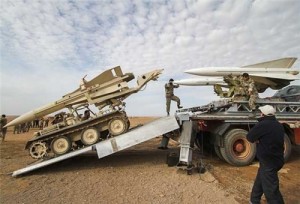 TEHRAN (FNA)- Iranian Defense Minister Hossein Dehqan said Washington is afraid of face-to-face battle and war with Iran.
TEHRAN (FNA)- Iranian Defense Minister Hossein Dehqan said Washington is afraid of face-to-face battle and war with Iran.
“The Americans do not have the courage to put themselves within our bullet-range, so naturally the sea and the Persian Gulf can be a place for any such conflict” if it ever arises, General Dehqan said, addressing the opening ceremony of the 15th Industrial Industries Conference in Tehran on Tuesday.
The Iranian defense minister said Washington is only left with one option if it ever decides to war with Iran and that option is using the Persian Gulf waters for remote war with Iran as it basically cannot stage a ground strike on Iran due to the aforementioned fear of face-to-face fight and confrontation.
Late in September, Commander of the Islamic Revolution Guards Corps (IRGC) Navy Rear Admiral Ali Fadavi said his forces are capable of posing immediate threat to the US naval troops in the region, and added that the IRGC Navy speedboats have made the American navy feel insecure in the Persian Gulf waters.“Today the US feels insecure due to the IRGC’s speedboats,” Rear Admiral Fadavi said on Tuesday, adding, “Our enemies believe that our country and the Islamic Iran has acquired deterrence power and it is due to this capability that no move has been made against our country ever since the end of the Iraqi imposed war (on Iran 1980-88).”
The IRGC Navy commander stressed that the Americans are now well-aware of Iran’s deterrence power and acknowledge it.
“One of the manifestations of this deterrence power is dominating the Persian Gulf,” Rear Admiral Fadavi said.
“Persian Gulf is different from the rest of the world in every aspect, and it is a very special zone that is called by the US as ‘a region where the vital resources of the US national security lay’ and even the Americans say that if they withdraw from Europe, they would still have a place for defense, but if they withdraw from the Persian Gulf, they would have nowhere else for defense,’” he added.
The IRGC Navy commander said the US has lost its power as a superpower and controlling the Persian Gulf waterway as the world's energy lifeline is the only way that the US can show that it still has a say in the world, "so they try hard to retain power in this energy corridor, while they are confronting Iran's power and the IRGC speedboats have made them feel insecure".
Iranian military commanders have underlined that the Iranian Armed Forces are closely monitoring all the military and civilian vessels of the United States' regional allies.
Last April, Fadavi had stressed his forces' domination and control over the US Navy ships in the Persian Gulf, and said that the American naval forces need IRGC's permission for any move in the regional waters.
"Today, Americans admit and acknowledge that the Persian Gulf is under the tight control of the IRGC Navy," Fadavi said at the time.
"This doesn't mean inspection (of their ships), but controlling (them). That is to say, they should receive our permission and account to us for any move they want to make," he explained.
Iran's naval power has even been acknowledged by foes. In a Sep. 11, 2008 report, the Washington Institute for the Near East Policy said that in the two decades since the Iraqi imposed war on Iran, the IRGC has excelled in naval capabilities and is able to wage unique asymmetric warfare against larger naval forces.
According to the report, the IRGC Navy has been transformed into a highly motivated, well-equipped, and well-financed force and is effectively in control of the world's oil lifeline, the Strait of Hormuz.
The study says that if Washington takes military action against the Islamic Republic, the scale of Iran's response would likely be proportional to the scale of the damage inflicted on Iranian assets.
By Fars News Agency
The Iran Project is not responsible for the content of quoted articles.

 QR code
QR code